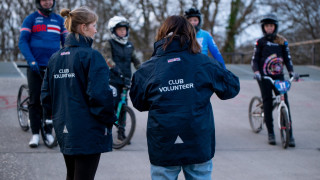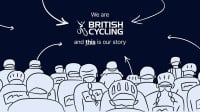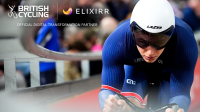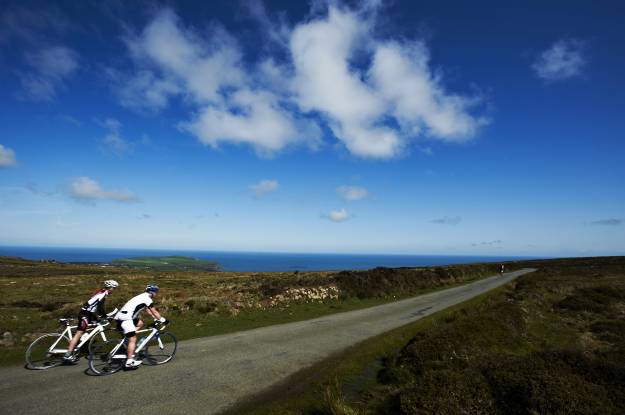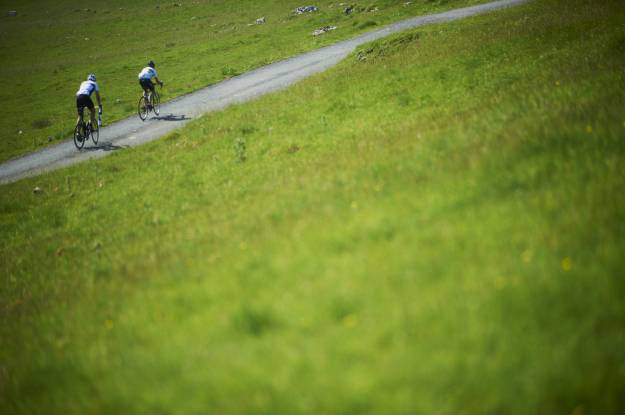The challenge of achieving net-zero and reducing carbon emissions is a challenge for all organisations, and it means leaving no stone left unturned, especially when it comes to impacts from the things we use every day - our supply chains or ‘Scope 3’ emissions.
This includes the branded uniform and teamwear worn by employees and athletes. One of the challenges with teamwear, especially as a national governing body or indeed any elite sports organisation, is that sponsors come and go. British Cycling also had to adapt to a regulation change regarding the colour of officials’ uniforms. This meant there was a small amount of unused, brand new kit in stock that couldn’t be used.
To solve this problem British Cycling teamed up with social enterprise, Stuff4Life Second Time to use their simple but highly effective debrand and rebrand service. This means the leftover uniform and teamwear can be used as originally intended – now available in the Second Time Shop and use the code ‘bccollection’ to access the products for your club.
Why it’s important
Every kilogram of sportswear (typically made of polyester and other polymers, made from oil) contains around 4 kilograms of embedded carbon. It’s very difficult to recycle this material as there are currently no commercial scale facilities for synthetic composite clothing. This means if it can’t be reused, any leftover teamwear or sportswear is highly likely to be incinerated. By rebranding its teamwear, British Cycling is able to avoid significant carbon emissions.
Each garment that is rebranded by using Stuff4Life’s unique ‘visible repair’ approach means the manufacturing impacts of making another garment are avoided.
There is also a significant social impact value from avoiding more garments from being manufactured in this way. This is because polymers (‘plastic’) have a very high impact on people and planet and are currently hard to recycle due to a lack of infrastructure. As a result, plastic attracts a very high social impact score with each kilogram valued at £158.02 by the Social Value Portal’s TOMS framework.
Impact
British Cycling and Stuff4Life Second Time identified 306kg (688 items) of incorrectly branded teamwear, some of which could be rebranded and used again. Around half of the total weight was made up of high-quality, unused outdoor jackets. Each of these jackets has been sympathetically rebranded to keep them in play for longer. A further 85kg of unused trousers, shorts, polo shirts and hoodies were also rebranded using Stuff4Life Second Time’s innovative re-embroidery technique.
Items which could not be rebranded included a number of garments which had been used and returned, including older grey Commissaire uniforms.
65% of garments collected have been rebranded, and the remaining 35% will go to Stuff4Life’s innovative recycling process which depolymerises synthetic fibres to recover materials so they can be used again to make as-good-as-new products.
The rebranded garments will shortly be available for clubs to purchase at significantly reduced rates via the Stuff4Life Second Time shop; many of the jackets were already branded ‘club volunteer’ and this legacy branding remains, meaning club volunteers will be clearly identifiable at club events whilst staying safe, dry and warm!
Stuff4Life is guaranteeing to take back rebranded garments when they reach the end of their ‘Second Time’ life so that they can also be recycled. This means the project will reduce carbon emissions by a total of 1.4 tonnes and has created a social impact value of more than £48,000.
The rebranded garments are being sold in order to ensure the value of each garment is recognised and items are cherished. These garments are literally as good as new… because they are new and they now have the correct branding at very little additional impact.
Caroline Julian, British Cycling’s Brand and Engagement Director, said:
“This modest sized project demonstrates there are carbon savings to be had in almost everything organisations do. Stuff4Life Second Time has been highly effective in creating an uncomplicated solution. The project has also been an important learning exercise for British Cycling in identifying ways of reducing and eliminating waste in our future procurement, for example in the way items are branded and indeed which items are branded.
“Partnerships with sponsors are hugely valuable to the sport and involve the production of new assets to enable our athletes, volunteers, events and communities to thrive. This means that there is often leftover branded products and materials that we can no longer use, but thanks to this project, we’ve been able to address this and bring our sustainability commitments into sharp focus."
Steve King, Stuff4Life Second Time founder, said:
“It’s been fantastic to work with British Cycling on this project we’re really grateful for their enthusiasm, enabling us to demonstrate how debranding and rebranding garments can be done in a cost-effective way to deliver significant savings in carbon and material impacts from a relatively small amount of material.
“We’re relatively new but we’ve already created the means and the supply chain necessary to deliver our rebranding services on a large scale alongside other activities including laundry, reuse, repair and recycling.”
For more information, please contact Steve King – hello@stuff4.life
To view the British Cycling Second Time collection visit https://www.stuff4.life/bc-shop and use the code ‘bccollection’ to access the products for your club.

